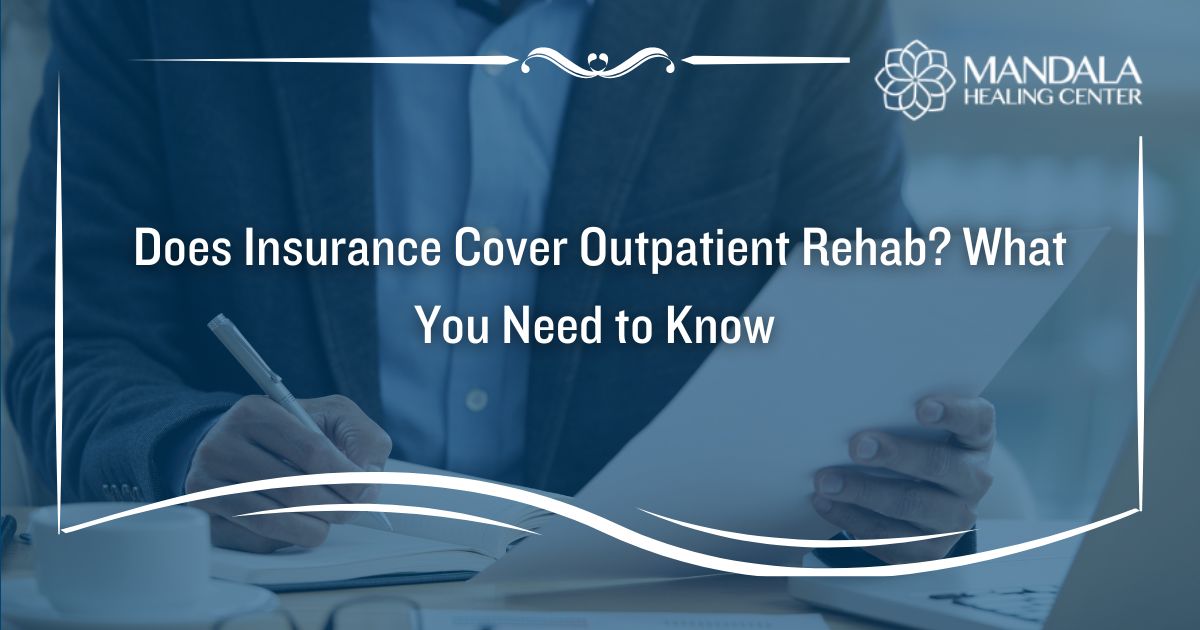Addiction is common in the United States, affecting millions of Americans each year. According to the National Institute on Drug Abuse (NIDA), while 10% of the population suffers from a substance use disorder, 75% of them never receive treatment.[1]
One of the biggest barriers to addiction treatment is money. Drug and alcohol rehab centers can be incredibly expensive. While paying for treatment can be a struggle, there are ways to make it more affordable.
Thankfully, health insurance companies are required to cover addiction treatment services, including inpatient rehab, outpatient treatment, and other types of programs. If you are thinking about attending an outpatient rehab center and you have health insurance, you might not know how to obtain coverage.
In most cases, insurance companies require you to find an in-network outpatient treatment center. To explain, this means you’ll need to choose a program that has a working relationship with your insurance company. To find one of these programs, you can either contact your insurance and ask for a list of in-network facilities or ask an admissions counselor at an outpatient facility to verify your benefits.
In this article, you will learn:
- Does insurance cover the cost of outpatient rehab?
- How can you verify your insurance benefits for outpatient treatment?
- How can you pay for outpatient rehab without insurance?
Does Insurance Pay for Outpatient Rehab?
Addiction care is considered an essential health benefit under the Affordable Care Act (ACA).[2] In other words, insurance companies are required to cover some form of addiction treatment. This includes programs like medical detox, inpatient treatment, and outpatient programs.
That said, insurance plans cover varying amounts of treatment. You might have some out-of-pocket costs that you are responsible for.
For example, if you have a deductible, you might have to meet it before your insurance company will pay for your treatment. Even further, you might have to cover co-pays for certain services that your outpatient program provides.
To sum things up, yes, insurance does pay for outpatient rehab. However, the coverage you receive can vary depending on your specific plan’s details. This is why you should always speak to your insurance provider about how much coverage for addiction treatment you have.
How to Verify Your Insurance Benefits
Long-term addiction can lead to increased mental health issues, chronic physical health conditions, and life-threatening overdoses. Substance abuse treatment is incredibly important, as it could save your life. If you are worried about the price of outpatient rehab, you should verify your insurance benefits before committing to a program.
The easiest ways to verify your benefits for outpatient rehab programming include:
Contacting Your Provider
You can call your insurance company and ask for a list of in-network outpatient rehab facilities. They will give you a variety of names, offering you the ability to choose a program that sounds like a good fit for you. This also ensures that all of the treatment centers you are considering accept your insurance.
Asking an Admissions Counselor
If you already have a specific outpatient rehab center in mind, you can contact the admissions counselor to verify your benefits. They’ll ask for your insurance information, run it through the system, and determine if it’s accepted at their facility.
How to Pay for Outpatient Rehab Without Insurance
If you do not have health insurance or your insurance is only covering a small portion of your treatment, you’ll need to figure out how to cover the costs. Because addiction treatment is the only way to ensure long-term recovery, it’s worth putting in the work to figure out how to pay for it.
Some of your options for paying for outpatient rehab without insurance include:
- Using personal savings or liquidizing assets
- Crowdsourcing the cost of rehab
- Asking family members for loans
- Getting personal or medical loans from a bank
- Choosing an outpatient program that offers payment plans or scholarships
- Finding a government or state-funded rehab program that is free or low-cost to attend
If you have to pay for outpatient rehab out of pocket, there are some things to consider. First, outpatient rehab tends to be a lot more inexpensive than inpatient treatment. You don’t have to cover the cost of housing, meals, and 24/7 care from medical professionals.
Additionally, some outpatient rehabs are designed and scheduled in a manner that allows you to continue working during treatment. This can allow you to recuperate the money you had to spend on addiction care and cover your bills during the process.
Verify Your Insurance Today With the Mandala Healing Center
If you or a loved one suffers from drug addiction or alcoholism, it’s time to seek professional help. While outpatient rehab tends to be less expensive than inpatient, it can still cost a pretty penny.
At the Mandala Healing Center, we understand that the financial responsibility of addiction treatment can be a lot. Because of this, we accept a wide variety of major insurance plans to ensure everyone has access to the care they need.
Why Choose The Mandala Healing Center? Clients are taken on a journey of healing through complete immersion into evidence-based clinical modalities, multifaceted alternative therapies, and expert medical management, allowing them to fully detox and recover from drug and alcohol addictions. Through a program of care designed to encourage change, a foundation is created that allows clients to find their higher purpose and reclaim their lives.
Contact us today to verify your insurance benefits and begin your recovery journey.
References:
- The National Institute on Drug Abuse (NIDA): 10 percent of US adults have drug use disorder at some point in their lives
- Office of National Drug Control Policy: Substance Abuse and the Affordable Care Act
















